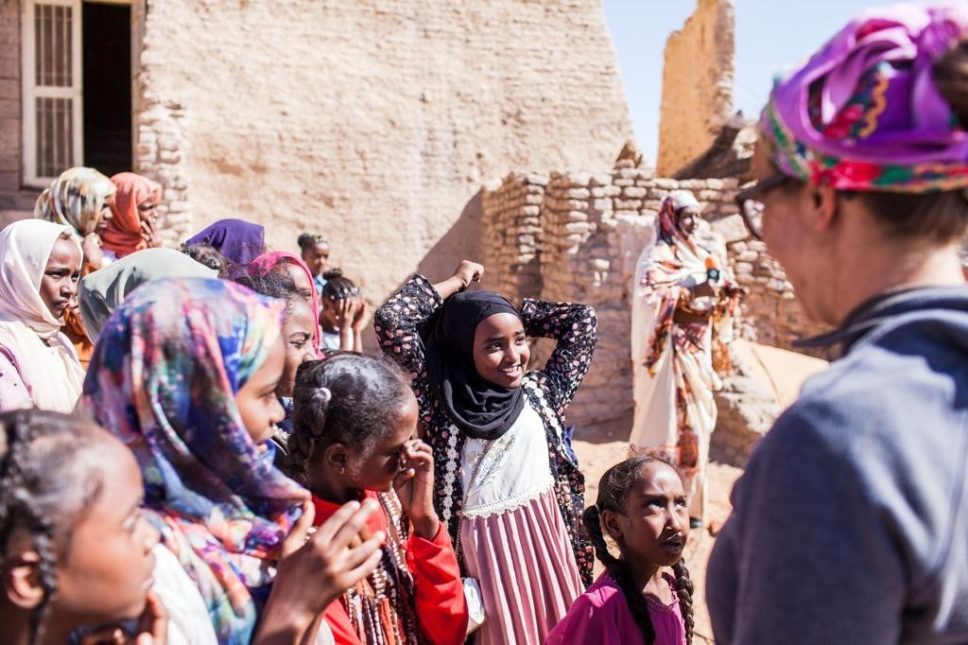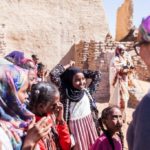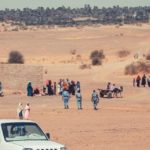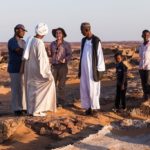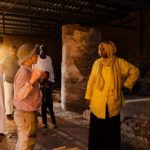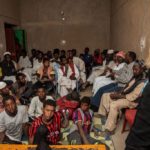The archaeological site in Dongola (Sudan) drew around 1000 visitors during an Open Day organized by the Polish Centre of Mediterranean Archaeology, University of Warsaw (PCMA UW) mission working at the site.
Two archaeological projects are now underway at the site, both under the PCMA UW auspices. One involves archaeological fieldwork, funded by ERC Starting Grant awarded to dr Artur Obłuski, with a focus on the Funj period (15th–18th century). The other is an interdisciplinary project “ArcheoCDN. Archaeological Center of Scientific Excellence”, supported by the “Dialog” grant from the Polish Ministry of Science and Higher Education.
Within the latter project, Open Days have been held at the Dongola archaeological site, which draw growing crowds of local visitors, not just from the nearest village of Al-Ghaddar but also from more remote places, with around 1000 people taking part in the December event. Another Open Day is scheduled to take place during the winter fieldwork campaign of 2020.
“The Polish Centre of Mediterranean Archaeology, University of Warsaw, aims at building a centre of scientific excellence, understood as a modern research unit conducting comprehensive and multidisciplinary research. We want to promote a broad view of the studied region, going beyond exploring its past, so as to take into account the full potential of the place – both its cultural heritage and contemporary conditions. Part of the approach is also to share our research results, not only with specialists but also with a wide audience. We also want to engage the local community in joint activities” – says Dr. Artur Obłuski, acting director of the PCMA UW.
Sudan was chosen as the first field for implementing this strategy because the PCMA’s research in this country has a long tradition (it has been going on since 1964), and Nubiology is a research field in which Polish scientists have significant achievements, appreciated internationally.
Building a research team with the right competences was key to this task. Innovative research at the intersection of various research fields requires particularly careful selection of specialists. One of the team involved in the ArcheoCDN project is Dr. Peter Bille Larsen, a social anthropologist of international renown, experienced in research in many regions around the world – Latin America, Asia, and Africa. The aim of his project is to develop a strategy to effectively involve the local community in the protection of Sudan’s cultural heritage. At the same time he is assessing the local cultural potential, such as tourist attractions or handicraft production, which can be used in economic activities that would support the local community. Open days are one of the elements of this project.
Another leg of the project is coordinated by Tomomi Fushiya, a specialist associated with the University of Leiden, experienced in building cooperation with the local community in the field of cultural heritage protection.
In mid-January, PCMA scholars returned to Dongola to continue their work. This winter further parts of the ArcheoCDN project will be carried out: an archaeological survey in the Bayuda desert and geological surveys in the area between the III and IV cataracts on the Nile.
-
Dr Agata Deptuła opowiada o wykopaliskach w Dongoli najmłodszym mieszkańcom Al-Ghaddar (Fot. M. Rekłajtis)
-
Mieszkańcy okolicznych miejscowości zmierzający na Dzień Otwarty w Dongoli (Fot. M. Rekłajtis)
-
Dr Dorota Dzierzbicka prezentuje stanowisko w Dongoli (fot. M. Mackiewicz)
-
Dr Dorota Dzierzbicka prezentuje stanowisko w Dongoli (fot. M. Mackiewicz)
-
Dr Dorota Dzierzbicka prezentuje stanowisko w Dongoli (fot. M. Mackiewicz)
-
Wykład na temat badań w Dongoli (Fot. M. Rekłajtis)

